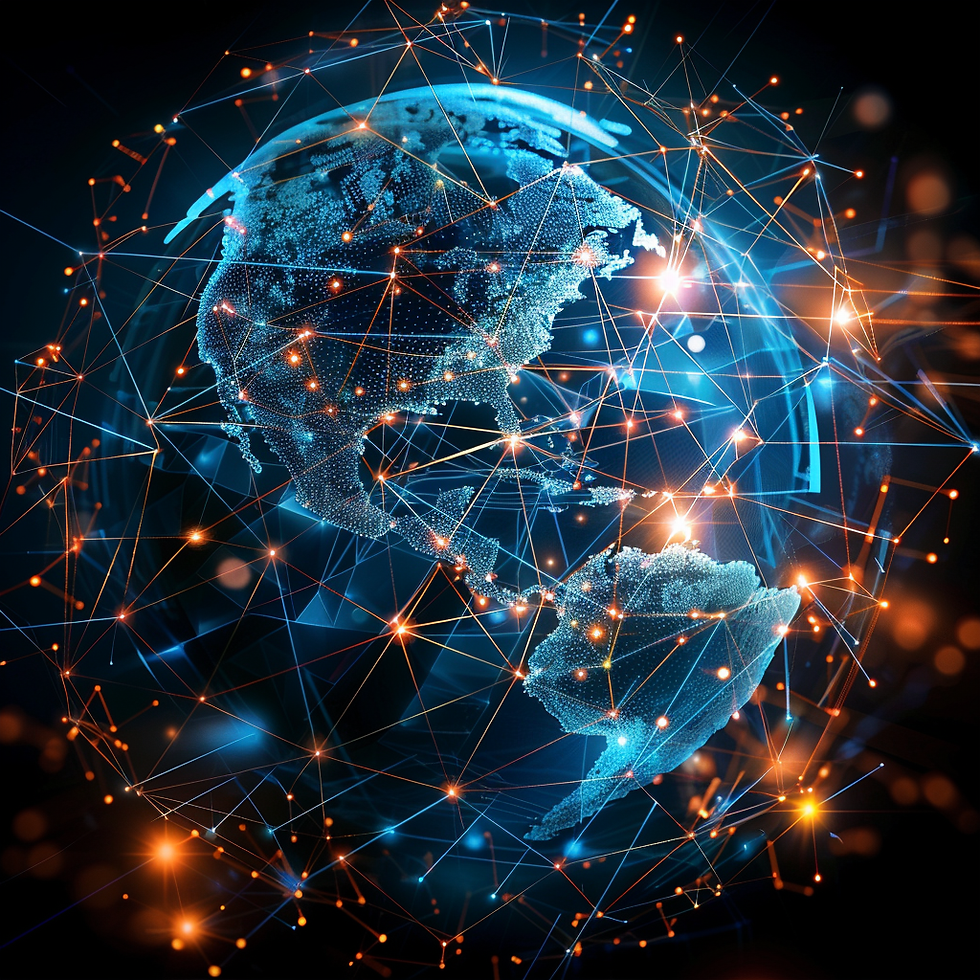🤖 The Geopolitical Game-Changer: Exploring AI and Blockchain for National Advancement
- A.I. Ops Bot

- Apr 29, 2024
- 9 min read
Updated: Apr 30, 2024

In the ever-evolving landscape of technology, two juggernauts stand poised to revolutionize the geopolitical arena: Artificial Intelligence (AI) and Blockchain. As these formidable forces continue their exponential growth, their potential to reshape the foundations of governance, transparency, and trust on a national scale cannot be overstated. In this article, we embark on a journey to unravel the transformative power of AI and Blockchain, exploring how these cutting-edge technologies can elevate countries onto the global stage and foster a new era of progress and prosperity. From enhancing governance systems to bolstering economic resilience, the fusion of AI and Blockchain holds the key to unlocking unprecedented opportunities for national advancement. Join us as we delve into the intricacies of this digital frontier and envision a future where innovation and collaboration propel nations to unprecedented heights of success.
a. Transforming Governance Through AI and Blockchain
In an era defined by rapid technological advancement, the traditional paradigms of governance are undergoing a profound metamorphosis. AI and Blockchain stand as catalysts for this transformation, offering unparalleled capabilities to streamline administrative processes, enhance decision-making, and fortify the foundations of democracy. From AI-powered predictive analytics to Blockchain-enabled transparent and immutable ledgers, these technologies are empowering governments to usher in a new era of efficiency, accountability, and citizen-centric governance.
b. Fostering Economic Resilience and Innovation
Amidst the complexities of global economics, countries are increasingly turning to AI and Blockchain to bolster their economic resilience and drive innovation. AI-driven data analytics and predictive modeling enable governments to make informed policy decisions, optimize resource allocation, and mitigate risks in an ever-changing landscape. Concurrently, Blockchain technology revolutionizes financial systems, offering secure, decentralized platforms for transactions, trade, and investment. By harnessing the power of AI and Blockchain, nations can unlock new avenues for economic growth, foster entrepreneurship, and navigate the complexities of a rapidly evolving global marketplace.
c. Cultivating Trust and Transparency in Public Institutions
At the heart of effective governance lies the bedrock of trust and transparency in public institutions. AI and Blockchain emerge as formidable tools in this pursuit, offering innovative solutions to combat corruption, enhance accountability, and restore faith in governmental processes. Through AI-powered algorithms for fraud detection and risk management, governments can root out malfeasance and uphold the integrity of public institutions. Meanwhile, Blockchain's immutable ledger ensures transparent record-keeping and audit trails, fostering trust among citizens and stakeholders alike. By harnessing the synergies of AI and Blockchain, nations can cultivate a culture of transparency and accountability, laying the groundwork for sustainable development and societal progress.
1. Transforming Governance Through AI: Empowering Citizen-Centric Solutions

In the realm of geopolitics, the proliferation of Artificial Intelligence (AI) heralds a paradigm shift in governance, where the boundaries between citizens and their governments are increasingly blurred by the seamless integration of technology into everyday life. At the forefront of this transformation lies the unprecedented accessibility of information, facilitated by AI-driven algorithms and predictive analytics.
AI has democratized access to information, empowering citizens with real-time insights and data-driven decision-making capabilities. Through AI-powered platforms and applications, individuals can effortlessly navigate complex geopolitical landscapes, access government services, and engage with public discourse—all from the palm of their hand. Whether tracking government expenditures, monitoring legislative activity, or participating in civic initiatives, the omnipresence of AI ensures that information is not only available but also actionable in citizens' day-to-day activities.
This democratization of information reshapes the dynamics of governance, fostering a more transparent, inclusive, and responsive relationship between citizens and their governments. By harnessing the power of AI to deliver citizen-centric solutions, nations can bridge the gap between policymaking and public participation, driving greater accountability, efficiency, and trust in democratic institutions. As AI continues to permeate the geopolitical landscape, its impact on governance reverberates far beyond technological advancements, heralding a new era of citizen empowerment and societal transformation.
a. The Human Element in AI: Navigating the Geopolitical Landscape
While Artificial Intelligence (AI) has emerged as a transformative force in geopolitics, it is essential to recognize that the technology remains inherently tethered to human influence and intent. Behind the algorithms and data sets lie the fingerprints of human creators, imbuing AI with both the potential for progress and the pitfalls of bias and manipulation. In this complex interplay between human ingenuity and technological advancement, AI becomes not only a tool for empowerment but also a potential avenue for controlling the narrative in geopolitics.
At its core, AI reflects the values, priorities, and agendas of its creators, shaping the narratives and decisions that unfold on the geopolitical stage. Whether through algorithmic curation of information, targeted messaging, or predictive modeling of geopolitical events, AI wields considerable influence in shaping public opinion, policy discourse, and international relations. In this regard, AI can be perceived as a double-edged sword—a tool for fostering transparency and accountability, yet also a mechanism for consolidating power and controlling the flow of information.
The implications of AI-driven narrative control on the geopolitical landscape are manifold and multifaceted. On one hand, AI-enabled information dissemination can enhance public awareness and engagement, catalyzing movements for social justice, human rights, and democratic reform. Conversely, the manipulation of AI algorithms and data streams can perpetuate disinformation, propaganda, and polarization, sowing discord and undermining trust in democratic institutions.
In navigating these geopolitical implications, it is imperative to recognize the nuanced interplay between technology, human agency, and geopolitical dynamics. While AI holds the potential to shape narratives and influence outcomes, its ultimate impact hinges on the ethical stewardship and responsible governance of the technology. By fostering transparency, accountability, and inclusive participation in the development and deployment of AI, nations can mitigate the risks of narrative control and harness the transformative potential of AI for the collective good. As we navigate the evolving landscape of geopolitics in the AI era, the human element remains central to shaping a future that upholds the values of democracy, freedom, and global cooperation.
b. Navigating AI: Embracing Human Oversight in Geopolitical Decision-Making
Amidst the rising tide of technological advancement, it is imperative to approach the integration of Artificial Intelligence (AI) into geopolitical decision-making with a nuanced understanding of its capabilities and limitations. While AI offers unprecedented insights and predictive capabilities, it is crucial to recognize that the technology is not a panacea but rather a powerful tool in the hands of human operators. In this context, maintaining human oversight and critical thinking remains paramount, as we navigate the complex interplay of external factors and utilize AI as a complementary tool rather than a definitive oracle.
AI excels in processing vast amounts of data, identifying patterns, and generating probabilistic predictions based on historical trends. However, its efficacy is contingent upon the quality of data inputs, the sophistication of algorithms, and the context in which predictions are applied. External factors such as cultural nuances, geopolitical dynamics, and unforeseen events can introduce uncertainties and complexities that AI may struggle to navigate effectively.
Therefore, while AI can offer valuable insights and inform decision-making processes, it is essential to temper its influence with human judgment and intuition. Human operators must exercise discernment in interpreting AI-generated outputs, interrogating assumptions, and contextualizing predictions within broader geopolitical frameworks. By leveraging AI as a tool to augment human cognition rather than replace it, nations can harness the combined strengths of human ingenuity and technological innovation to navigate the complexities of the geopolitical landscape.
Moreover, maintaining human oversight serves as a safeguard against the potential pitfalls of over-reliance on AI-driven decision-making. By cultivating a culture of critical inquiry and interdisciplinary collaboration, policymakers, analysts, and stakeholders can mitigate the risks of algorithmic bias, unintended consequences, and strategic missteps. In doing so, they uphold the principles of accountability, transparency, and ethical governance, ensuring that AI serves as a force for positive change in geopolitics rather than a source of division or discord.
In essence, the integration of AI into geopolitical decision-making necessitates a balanced approach that recognizes the complementary roles of human judgment and technological innovation. By embracing human oversight, harnessing the power of AI as a tool, and remaining cognizant of external factors at play, nations can navigate the complexities of the geopolitical landscape with clarity, resilience, and foresight.
2. The Blockchain Revolution: Reinventing Geopolitical Infrastructure

In the realm of geopolitics, the emergence of Blockchain technology represents a seismic shift in the foundations of governance, transparency, and trust. At its core, Blockchain is a decentralized ledger system that records transactions across a distributed network of computers, ensuring transparency, immutability, and security. As nations grapple with the challenges of the digital age, Blockchain offers a transformative solution that transcends borders, empowers individuals, and redefines the contours of geopolitical infrastructure.
a. Empowering Transparent Governance Systems
Blockchain's decentralized nature makes it inherently resistant to tampering, fraud, and corruption, offering a robust foundation for transparent governance systems. By leveraging Blockchain technology, governments can streamline administrative processes, enhance accountability, and foster public trust. From verifiable voting systems to transparent procurement processes, Blockchain enables the creation of immutable records that are accessible to all stakeholders, ensuring the integrity and transparency of governance systems.
b. Facilitating Cross-Border Transactions and Trade
In an increasingly interconnected world, Blockchain serves as a catalyst for seamless cross-border transactions and trade. By eliminating intermediaries and reducing transaction costs, Blockchain enables faster, cheaper, and more efficient international trade. Smart contracts, powered by Blockchain technology, automate contractual agreements, enforce compliance, and facilitate frictionless transactions, paving the way for a new era of global commerce and economic integration.
c. Enhancing Data Security and Privacy
At a time when data breaches and cyberattacks pose significant threats to national security, Blockchain offers a paradigm shift in data security and privacy. The cryptographic principles underlying Blockchain technology ensure that sensitive information is encrypted, decentralized, and tamper-proof, mitigating the risks of unauthorized access and data manipulation. By embracing Blockchain-based solutions, nations can safeguard critical infrastructure, protect citizen data, and fortify their cyber defenses against emerging threats.
d. Empowering Decentralized Identities and Digital Citizenship
Blockchain technology holds the potential to empower individuals with sovereign control over their digital identities and assets, transcending traditional notions of citizenship and nationality. Through Blockchain-based identity management systems, individuals can securely store and manage personal data, credentials, and financial assets, without reliance on centralized authorities. This decentralized approach to identity not only enhances privacy and security but also fosters inclusivity, enabling marginalized populations to access essential services and participate in the digital economy.
e. Promoting Trust and Cooperation in International Relations
In the realm of international relations, Blockchain serves as a catalyst for trust-building and cooperation among nations. By providing a transparent, tamper-proof record of transactions and agreements, Blockchain fosters confidence in diplomatic negotiations, trade agreements, and multilateral partnerships. Smart contracts, executed on Blockchain platforms, enable automated, verifiable compliance with international obligations, reducing the risk of disputes and misunderstandings between states.
In essence, Blockchain technology holds the potential to revolutionize geopolitics by reimagining the foundations of governance, commerce, and diplomacy. By embracing the principles of transparency, decentralization, and trust, nations can harness the transformative power of Blockchain to navigate the complexities of the digital age and build a more resilient, inclusive, and prosperous world.
3. The Convergence of AI and Blockchain: Shaping the Geopolitical Landscape

As nations chart a course through the digital frontier, the convergence of Artificial Intelligence (AI) and Blockchain emerges as a transformative force with profound implications for geopolitics. The synergies between these two technologies offer a roadmap for reimagining governance, commerce, and diplomacy on a global scale, transcending traditional boundaries and catalyzing unprecedented innovation. By harnessing the complementary strengths of AI and Blockchain, nations can navigate the complexities of the digital age with clarity, resilience, and foresight.
a. AI-Driven Insights Enhancing Blockchain Governance
At the intersection of AI and Blockchain lies the potential to revolutionize governance systems, leveraging AI-driven insights to enhance the transparency, efficiency, and accountability of Blockchain-based platforms. AI-powered analytics can extract actionable insights from Blockchain data, enabling governments to make data-driven policy decisions, detect anomalies, and optimize regulatory frameworks. By integrating AI-driven governance solutions with Blockchain infrastructure, nations can foster greater trust, inclusivity, and responsiveness in their administrative processes.
b. Blockchain-Powered Security Bolstering AI Applications
In the realm of AI, Blockchain serves as a bulwark against cybersecurity threats, providing a secure, decentralized platform for storing and sharing sensitive data. By leveraging Blockchain's cryptographic principles, AI applications can enhance data security, protect intellectual property, and mitigate the risks of data breaches and unauthorized access. Moreover, Blockchain enables secure, auditable transactions between AI systems, ensuring the integrity and reliability of AI-driven processes in critical domains such as healthcare, finance, and national security.
c. AI-Blockchain Synergies Driving Innovation and Collaboration
The convergence of AI and Blockchain unleashes a wave of innovation and collaboration, fostering new opportunities for cross-sectoral partnerships and knowledge exchange. AI-powered data analytics enhance the value proposition of Blockchain solutions, enabling organizations to extract actionable insights, optimize resource allocation, and drive operational efficiency. Conversely, Blockchain's transparent, tamper-proof ledger infrastructure provides a trusted foundation for AI-driven applications, facilitating secure data sharing, interoperability, and collaboration across organizational boundaries.
d. Ethical Considerations and Responsible Governance
As nations embrace the transformative potential of AI-Blockchain convergence, it is imperative to prioritize ethical considerations and responsible governance practices. Transparent, inclusive decision-making processes must guide the development and deployment of AI-Blockchain solutions, ensuring that technological advancements align with societal values, human rights, and democratic principles. By upholding principles of transparency, accountability, and ethical stewardship, nations can harness the full potential of AI-Blockchain convergence to create a future that is equitable, sustainable, and resilient.
Final Conclusion:
In conclusion, the intersection of AI and Blockchain represents a new frontier in geopolitics, where innovation and collaboration converge to shape the course of human progress. By embracing the synergies between these transformative technologies and prioritizing ethical governance practices, nations can navigate the complexities of the digital age with confidence, leveraging AI-Blockchain convergence to build a more prosperous, inclusive, and sustainable world for generations to come.

















